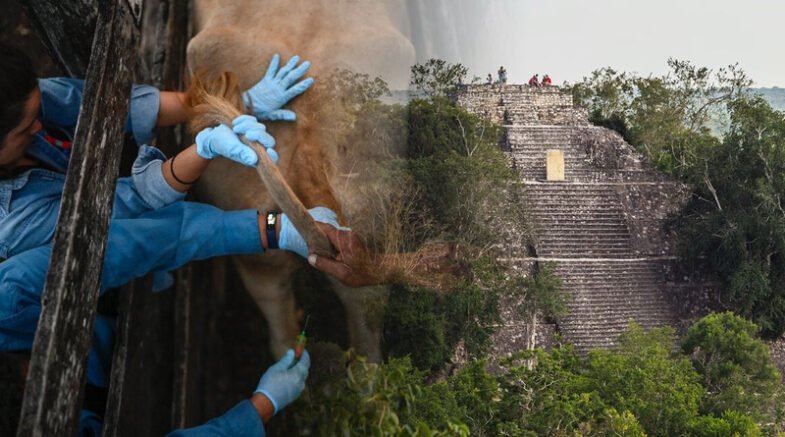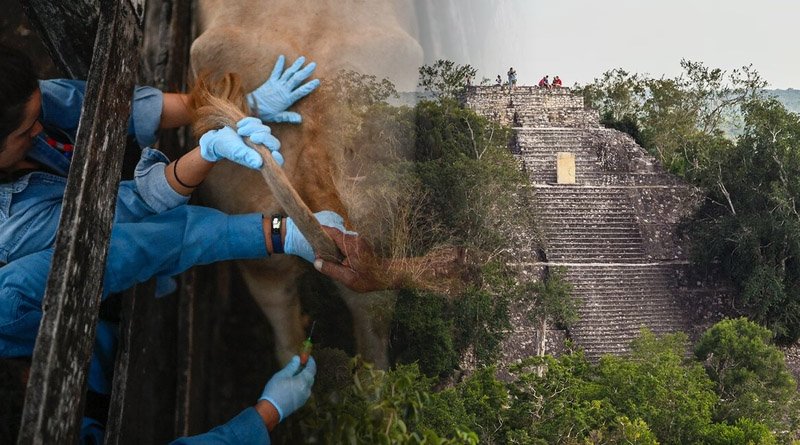The goal in the Yucatan is to develop a zoonoses diseases prevention strategy that can be used as an example by the rest of the world, according to Roche.

Omar Garcia collected blood and fluids from a bat as dusk fell in the Yucatan jungle of Mexico as part of a French-Mexican project to find zoonoses diseases.
The international scientific community is looking into bats as a potential source of coronavirus transmission. Garcia held the winged mammal still while it bore its fangs before releasing it. Zoonoses diseases can be classified according to the etiologic agent.
Since 2017, researchers from the National Autonomous University of Mexico (UNAM) and France’s Research Institute for Development (IRD) have worked together on the study in Merida, the capital of the Yucatan state.
According to Audrey Arnal, an infectious diseases specialist at the IRD, the goal is to learn how various viruses that are transmitted between animals, such as mammals, birds, and rodents, may potentially spread to humans. This is zoonosis, she explained, “understanding what the effects of interacting with wildlife might be and then determining what might be the next epidemic that can emerge from nature.”
In the diverse ecosystem of the tropical rainforest, where they have discovered 61 species of mosquitoes, scientists collect samples of a wide variety of animals.
In order to “complete the history of the transmission cycle” of viruses, “we have many questions,” according to UNAM biologist Maria Jose Tolsa, who feels that the significance of her work has finally been acknowledged after ten years of study. A pandemic has detrimental effects on both the economy and public health, she said.
Benjamin Roche, a specialist in ecology and evolutionary biology at the IRD stated that the region was chosen for the study because of its rapid deforestation, which has made it “a highly emblematic region in terms of zoonoses diseases emergency risks.”
According to estimates, between 500,000 and 800,000 viruses could have an impact on people, he added. According to researchers, the risks increase as agriculture and tourism develop and increase human-animal contact.
To construct the Mayan Train, President Andres Manuel Lopez Obrador’s signature tourist rail project, thousands of trees were cut down in the Yucatan Peninsula. The Mayan Train is slated to begin service in December.
The creation of the second-largest tropical rainforest reserve in the world, behind the Amazon, is how the government claims it is making up for the loss. The secret, according to Arnal, is to strike a balance between nature and humans. The population needs to eat, live, and grow their economy, she continued. Twelve communities from the three states that make up the Yucatan Peninsula are participating in the study.
Rosa Elena Sarmiento from the virology lab of the UNAM Veterinary School said, “We’ve found species in birds that have been identified as reservoirs for the West Nile virus or influenza. Excellent revealer At first light, a dozen fine nets are set up in the field to capture birds. At dusk, bats and even owls take the stage.
Once captured, samples of blood, fluid, and ectoparasites are taken, if present. Before releasing an animal, scientists first identify it, measure it, record the data, and assess its health.
The material is later subjected to a laboratory analysis. DNA is a great revealer, according to Arnal. She continued, “With the blood of the mosquito, we can identify which species or animal was bitten.
Additionally, blood samples from locals will be collected to check for the presence of any virus that originated from an animal. The project also involves community consultations to learn about their environmental and social issues and to promote natural coexistence practises.
The Mexican Association of Conservation Medicine member who communicates with locals, Erika Marce Santos, said: “There needs to be a knowledge dialogue with the communities.” The Preventing Zoonotic Disease Emergence initiative connects the Merida laboratory with others in Africa, South Asia, and other Latin American nations.
It unites 200 organisations and 22 nations when it is introduced by France in 2022. The goal in the Yucatan is to develop a zoonoses prevention strategy that can be used as an example by the rest of the world, according to Roche.
